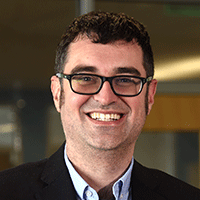
Christopher Ritter
Director, Digital Innovation Center of Excellence
Department Manager, Digital Engineering
Idaho National Laboratory
Christopher Ritter is the director of the Digital Innovation Center of Excellence and department manager for Digital Engineering at Idaho National Laboratory (INL). At INL, he leads digital twinning, digital engineering, and digital thread technologies across a portfolio of energy, nuclear, non-proliferation, and defense applications. He has led research and development of new INL capabilities to foster digital innovation including energy ontologies, model-based design processes, digital thread software (ex. Deep Lynx), on-demand cloud architectures, and application of explainable artificial intelligence models to enable the laboratory's net zero energy future.
His research at INL has been featured in the American Society of Mechanical Engineers magazines and journals, Federal News Network, American Nuclear Society Newswire, and as a plenary speaker at digital twin events. Additionally, he is a staunch supporter of inclusive diversity and serves as co-president of Newcomers in Leadership for the Executive Inclusion Council at INL.
Before coming to INL, he was director of software development at SPEC Innovations, in Manassas, Virginia. He served as the chief architect of Innoslate, a popular systems engineering tool used in 107 countries around the world that leverages elastic cloud technologies and AI/NLP for high scalability and advanced analytics. Architected the software system and consulted on the data ontology for a centralized mission risk management system for the Joint Staff at the Pentagon and supported Marine Corps business process reengineering for its Capability Portfolio Management processes. He was also a computer programming teacher for 4 years at St. Michael's Academy in Warrenton, Virginia and developed an elementary school computer science curriculum. He holds a bachelor's degree in computer science from Virginia Polytechnic Institute and State University (Virginia Tech).
His primary research interest is holistic approaches to the development of digital twins across energy and defense applications.